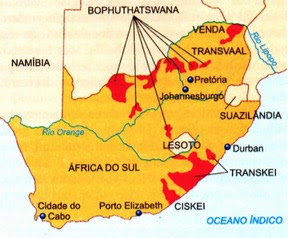Apartheid
Implemented gradually since 1926, the policy of apartheid has explosive ethnic conflicts, cultural, political and social of South Africa, provoking intense condemnation by world opinion.
Apartheid means " separation " in Afrikaans (South African language made up of Dutch seventeenth century mixed with other European languages and at least two African).It is the name given to the South African legislation by which the ruling class of white descendants of the Dutch settlers (the Boers) began to exert complete control over the state and national society, only granting access to citizenship to other whites, Asians ( three percent) and mestizos (nine percent), the latter two groups in terms almost expressionless.
Apartheid, so it was not a mere racism , because it constituted a social, economic, political and constitutional system that was intended to stop the ethnic integration in South Africa.
From the political point of view, apartheid created a kind of white aristocracy based on a rigid hierarchy of racial castes, for which there was a direct relationship between skin color and the possibilities of access to citizenship and property.
Blacks (seventy percent) had no right to vote or representatives in the legislature. Also it was denied the right to urban property; marriage or sexual intercourse with white partner;circulating outside the defined territories for its occupation by the government (except with special passes); and to exercise offices, positions or professions were not consenting authorities.
The ideological legitimation of the superiority of the "volk" (people) Boer was promoted by the Dutch Reformed Church, which he attributed to God the choice of the Afrikaner as dominant.
In the 1960s and 1970s, the perversity ofApartheid was expanded:. The main black leaders who fought against the regime were brutally persecuted or killed Nelson Mandela , the main black leader, was imprisoned between 1962 and 1990. Steve Biko, another leader too important, he was arrested, violently tortured and murdered after several interrogations in prison in 1977. opposition parties to the racist regime, as the ANC - African National Congress - Nelson Mandela, were considered illegal and banned.
Bantustans: Bophuthatswana, Sale, Transkei and Ciskei
The perversity of the racist South African government were constantly improved. The government has to implement a geographic segregation system whereby blacks would be restricted to small autonomous territories within South Africa, Bantustans , often poor areas with no infrastructure.
In the cities, the neighborhoods were separated: the rich and middle class neighborhoods were for whites; the poor and slum neighborhoods, with poor conditions were for the black majority and mestizo and were called Townships .
APARTHEID END
In the 1980s, international and domestic opposition pressure began to shake the racist South African regime. The country suffered UN political and economic sanctions and was even forbidden to participate in sporting events like the World Cup and the Olympics.
Internally, they have widened the conflict between the forces of repression and the black majority and the country came to the brink of civil war. In the late 80s, he came to power Frederik De Klerk's National Party. The white minority, pressed, was forced to make concessions. Apartheid was coming to an end.
Finally, Nelson Mandela was released after nearly three decades of suffering and resistance. Free, he negotiated with the white minority pacification of the country and the establishment of a true democracy.
The year 1994 was a milestone for South Africa and for humanity: there were the first free elections and Nelson Mandela, the ANC - African National Congress, was the big winner.Between 1994 and 1999, Mandela held a government of national reconciliation and successful.
The new administration invested heavily in order to reduce poverty among the black majority and mestizo, intensifying the actions in health, education and land reform. However, Mandela inherited a country with deep social and racial inequalities. In the 1999 elections, Mandela left power and made her vice-president Thabo Mbeki to take his successor.Mbeki was elected president by an absolute majority of votes.
The white minority still has country standard of living developed and controls much of the economy. Despite the formation of a black middle class, most still is in poverty. About 40% of the black population is unemployed.Crime rates, including against women through rape, are among the world's largest.Overcoming social differences between whites, coloreds and blacks is a task for years of government.
Category: General history














0 komentar